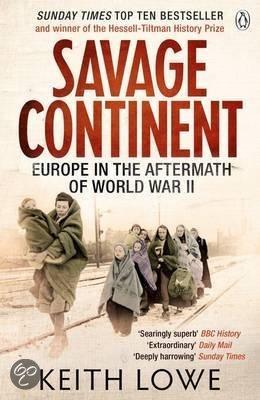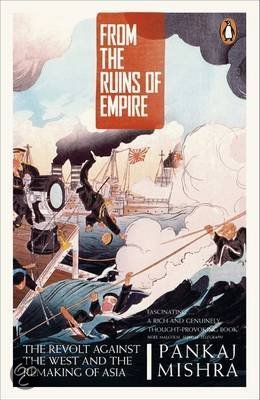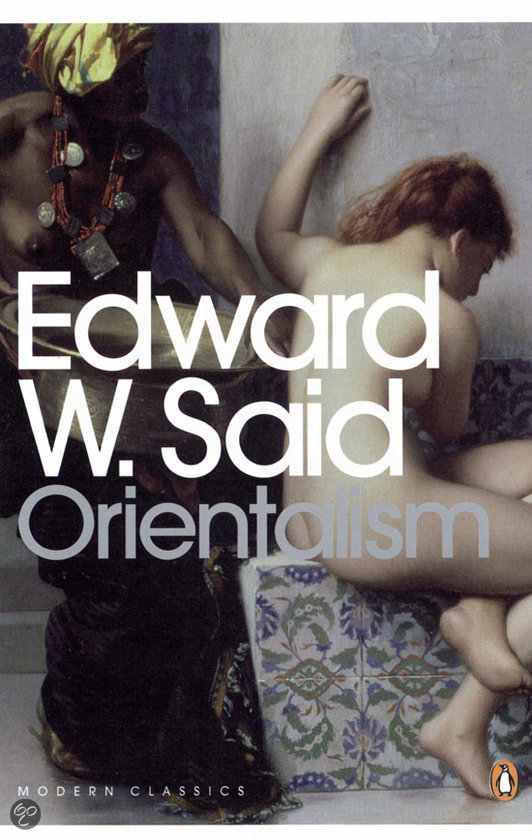Middels een druk op deze knop te koop voor iets meer dan een tientje bij Bol.com

Voor onze maartsessie hebben we gekozen voor een boek door een niet-Westerse schrijver:
From the Ruins of Empire
The Revolt Against the West and the Remaking of Asia
Auteur: Pankaj MishraPankaj Mishra's provocative account of how China, India and the Muslim World are remaking the world in their own image - shortlisted for the Orwell Prize 2013. It is shortlisted for the Orwell prize 2013. Viewed in the West as a time of self-confident progress, the Victorian period was experienced by Asians as a catastrophe. As the British gunned down the last heirs to the Mughal Empire or burned down the Summer Palace in Beijing, it was clear that for Asia to recover a new way of thinking was needed. Pankaj Mishra re-tells the history of the past two centuries, showing how a remarkable, disparate group of thinkers, journalists, radicals and charismatics emerged from the ruins of empire to create an unstoppable Asian renaissance, one whose ideas lie behind everything from the Chinese Communist Party to the Muslim Brotherhood, and have made our world what it is today. Reviews: Arrestingly original ...this penetrating and disquieting book should be on the reading list of anybody who wants to understand where we are today . (John Gray, Independent). A riveting account that makes new and illuminating connections ...deeply entertaining and deeply humane . (Hisham Matar). Fascinating ...a rich and genuinely thought-provoking book . (Noel Malcolm, Sunday Telegraph). Provocative, shaming and convincing . (Michael Binyon, The Times). Lively ...engaging ...retains the power to shock . (Mark Mazower, Financial Times). Subtle, erudite and entertaining . (Economist, New Delhi). About the author: Pankaj Mishra is the author of Butter Chicken in Ludiana, The Romantics, An End to Suffering and Temptations of the West. He writes principally for the Guardian, The New York Times, London Review of Books and New York Review of Books. He lives in London, Shimla and New York.
Middels een druk op de knop voor 12,49 bij BOl te koop

Via Amazon is een ebook helft goedkoper: http://amzn.to/1RylZZR
Ik heb er zelf deze bijbesteld:
Auteur: Edward W. Said
Uitgever: Penguin Books Ltd
For generations now, Edward W. Said's Orientalism has defined our understanding of colonialism and empire, and this Penguin Modern Classics edition contains a preface written by Said shortly before his death in 2003. In this highly-acclaimed work, Edward Said surveys the history and nature of Western attitudes towards the East, considering orientalism as a powerful European ideological creation - a way for writers, philosophers and colonial administrators to deal with the 'otherness' of eastern culture, customs and beliefs. He traces this view through the writings of Homer, Nerval and Flaubert, Disraeli and Kipling, whose imaginative depictions have greatly contributed to the West's romantic and exotic picture of the Orient. Drawing on his own experiences as an Arab Palestinian living in the West, Said examines how these ideas can be a reflection of European imperialism and racism. Edward W. Said (1935-2003) was a Palestinian-American cultural critic and author, born in Jerusalem and educated in Egypt and the United States. His other books include The Question of Palestine , Culture and Imperialism and Out of Place: A Memoir . If you enjoyed Orientalism , you might like Frantz Fanon's The Wretched of the Earth , also available in Penguin Modern Classics . Stimulating, elegant and pugnacious . ( Observer ). Beautifully patterned and passionately argued . ( New Statesman ). Very exciting ...his case is not merely persuasive, but conclusive . (John Leonard, New York Times ). Magisterial . (Terry Eagleton).

EEN ECHTE VREEMDELINGENJURIST KENT OOK DE GESCHIEDENIS
Interessant artikel? Deel het eens met uw netwerk en help mee met het verspreiden van de bekendheid van dit blog. Er staan wellicht nog meer artikelen op dit weblog die u zullen boeien. Kijk gerust eens rond. Zelf graag wat willen plaatsen? Mail dan webmaster@vreemdelingenrecht.com In verband met geldwolven die denken geld te kunnen claimen op krantenartikelen die op een blog als deze worden geplaatst maar na meestal een dag voor de krantenlezers aan leeswaardigheid hebben ingeboet terwijl wij vreemdelingenrecht specialisten ze soms wel nog jaren gebruiken om er een kopie van te maken voor een zaak ga ik over tot het plaatsen van alleen het eerste stukje. Ja ik weet het: de kans dat u doorklikt is geringer dan wanneer het hele artikel hier staat en een kopie van het orgineel maken handig kan zijn voor uw zaak. Wilt u zelf wat overnemen van dit weblog. Dat mag. Zet er alleen even een link bij naar het desbetreffende artikel zodat mensen niet alleen dat wat u knipt en plakt kunnen lezen maar dat ook kunnen doen in de context.







Geen opmerkingen:
Een reactie posten